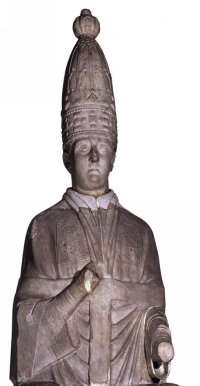Although both the Sabbatical and Jubilee years were commanded by God (Leviticus 25), the Old Testament is silent regarding if and when these special periods were kept by ancient Israel. There is one New Testament event, however, that reveals the occurrence of a Jubilee year. This information will allow us to discover the mysterious numbers linked to these two Biblically important periods!
Jesus Declares a Jubilee!
In 27 A.D. the Lord attends his hometown synagogue in Nazareth on the day of Pentecost. Asked to read from Scripture, he selects Isaiah 61 verses 1 and 2 which is normally read on the Day of Atonement.
"The Spirit of the Lord is upon Me; for this reason, He has anointed Me to preach the gospel to the poor; He has sent Me to heal those who are brokenhearted . . . TO PROCLAIM THE ACCEPTABLE YEAR OF THE LORD." . . .
Then He began to say to them, "Today, this scripture is being fulfilled in your ears." (Luke 4:18 - 19, 21, HBFV).
Jesus was proclaiming that the "acceptable year of the Lord," which is a direct reference to the Jubilee year declared on Atonement (Leviticus 25:9 - 10), was taking place as he spoke (Appointed Times of Jesus the Messiah, Appendix C)!
The Jubilee Jesus declared had begun at sunset on September 10 and ran until sunset the next day in 26 A.D., the same day His ministry began! This special year lasted until sunset on September 29 in 27 A.D. Prior to it was a Sabbatical year, which ran from sunset on September 12 in 25 A.D. to sunset September 2 of 26 A.D.
Jubilee Numbers
The keeping of Sabbatical and Jubilee years required the Israelites to first receive their inheritances in the Promised Land before they could be celebrated (see Leviticus 25:1 - 2). The dividing of the Promised Land by lot took place under Joshua in 1398 B.C. (Joshua 14).
The number of Jubilee years from 1398 B.C. to when the northern tribes of Israel went into captivity in 723 B.C. is 14. There were 17 Jubilees from 1398 to the final conquering of Judea and the destruction of Jerusalem's temple in 586 B.C.
The number of Jubilee years from 1398 B.C. to 1 B.C. is 29. The number of Jubilee years from 1 A.D. to 2024 A.D. is 41.
The most common day of the week starting time for all Jubilees, from 1398 B.C. to 2024 A.D., is at sunset on a Friday (25 occurrences) followed by sunset Tuesday (21).
Jesus, of course, only experienced one Jubilee year his entire earthly life. When the Jubilee started in 26 A.D. the Lord was 30 years old.
The most common date for the start of the Jubilee is at sunset on September 22 (5 occurrences) followed by September 15, 19, 20, 27 and 29 (4 each).
The 70th Jubilee year since all the tribes of Israel received their inheritance in the Promised Land began at sunset on October 12, 1986 and ran to sunset October 3, 1987. The next Jubilee, the 71st, will take place from sunset October 12, 2035 to sunset October 1, 2036.
Sabbatical Numbers
The Sabbatical years of Jesus' life, prior to the one that occurred just before he declared a Jubilee, were 4 to 3 B.C., 4 to 5 A.D., 11 to 12 and 18 to 19 A.D. The Lord turned 22 years old when the Sabbatical year began in 18 A.D.
The number of Sabbatical years from 1398 B.C. to when the northern tribes of Israel went into captivity in 723 B.C. is 97. 116 Sabbaticals took place from 1398 to the final conquering of Judea and the destruction of Jerusalem's temple in 586 B.C.
The number of Sabbatical years from 1398 B.C. to 1 B.C. is 200, with another 289 taking place from 1 A.D. to 2024 A.D.
The most common day of the week starting time for all Sabbatical years from 1398 B.C. to 2024 is at sunset on Wednesday (154). The next most frequent starting time is sunset Sunday (139).
The most common date for the start of a Sabbatical year is sunset on September 21 (27) followed by sunsets on September 9, 16 and 7 (26).
The most recent Sabbatical year ran from sunset September 18, 2020 to sunset September 7, 2021. The next Sabbatical year will run from sunset October 1 in 2027 A.D. to sunset September 21, 2028.
A Christian Jubilee?
Pope Boniface VIII instituted the first Roman Catholic (Christian) Jubilee in 1300 A.D.
"It is commonly stated that Pope Boniface VIII instituted the first Christian Jubilee in the year 1300, and it is certain that this is the first celebration of which we have any precise record, but it is also certain that the idea of solemnizing a fiftieth anniversary was familiar to medieval writers, no doubt through their knowledge of the Bible, long before that date." (1913 Catholic Encyclopedia article on "Holy Year of Jubilee").
Subsequent Popes declared Jubilees for the years 1350, 1390, 1423, 1450, 1475, 1825 and 1900 A.D.

The Catholic proclaimed Jubilee of 1300 A.D. overlapped the one in the Bible which started at sunset on September 23 of the same year. In 1350 it also overlapped this Biblically mandated period which ended on sunset September 13 of the same year. All the other years declared by the Pope did not overlap the Biblical Jubilee.